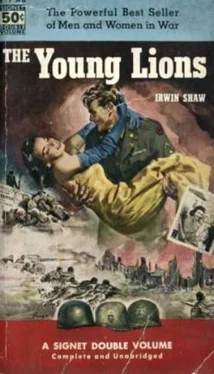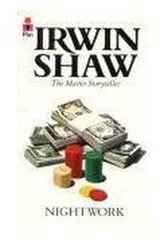Irwin Shaw - The Young Lions
Здесь есть возможность читать онлайн «Irwin Shaw - The Young Lions» весь текст электронной книги совершенно бесплатно (целиком полную версию без сокращений). В некоторых случаях можно слушать аудио, скачать через торрент в формате fb2 и присутствует краткое содержание. Жанр: Классическая проза, на английском языке. Описание произведения, (предисловие) а так же отзывы посетителей доступны на портале библиотеки ЛибКат.
- Название:The Young Lions
- Автор:
- Жанр:
- Год:неизвестен
- ISBN:нет данных
- Рейтинг книги:4 / 5. Голосов: 1
-
Избранное:Добавить в избранное
- Отзывы:
-
Ваша оценка:
- 80
- 1
- 2
- 3
- 4
- 5
The Young Lions: краткое содержание, описание и аннотация
Предлагаем к чтению аннотацию, описание, краткое содержание или предисловие (зависит от того, что написал сам автор книги «The Young Lions»). Если вы не нашли необходимую информацию о книге — напишите в комментариях, мы постараемся отыскать её.
The Young Lions — читать онлайн бесплатно полную книгу (весь текст) целиком
Ниже представлен текст книги, разбитый по страницам. Система сохранения места последней прочитанной страницы, позволяет с удобством читать онлайн бесплатно книгу «The Young Lions», без необходимости каждый раз заново искать на чём Вы остановились. Поставьте закладку, и сможете в любой момент перейти на страницу, на которой закончили чтение.
Интервал:
Закладка:
Hardenburg's letters from Rennes were stiff, almost military documents, empty, windy, cold. Christian couldn't help smiling as he read them, knowing that Hardenburg, if he survived the war, would be a forgotten and carelessly discarded article in Gretchen's swirling past. For the future, Christian had plans that he only half-admitted to himself. Gretchen had told him one night, casually, between one drink and the next, that the war would be over in sixty days and that someone high in the Government, she wouldn't tell Christian his name, had offered her a three-thousand-acre estate in Poland. There was a seventeenth-century stone mansion, untouched by war, on it, and seven hundred acres were under cultivation, even now.
"How would you be," she had asked, half-joking, lying back on the sofa, "at running an estate for a lady?"
"Wonderful," he had said.
"You wouldn't wear yourself out," she had said, smiling, "with your agricultural duties?"
"Agreed." He had sat down beside her and put his hand under her head and caressed the firm, fair skin at the base of her neck.
"We'll see. We'll see…" Gretchen had said. "We might do worse…"
That would be it, Christian thought. A great wild estate, with the money rolling in, and Gretchen mistress of the old house… They wouldn't marry, of course. Marrying Gretchen was an act of supererogation. A kind of private Prince Consort, with hand-made riding boots and twenty horses in the stables and the great and wealthy of the new Empire coming down from the capitals for the shooting…
The luckiest moment of my life, Christian thought, was when Hardenburg unlocked that desk and took the package of black lace out of it in the police barracks in Rennes. Christian hardly thought of Rennes any more. Gretchen had told him she had talked to a Major-General about his transfer and commission and it was in the works. Hardenburg was a miserable phantom of the past now, who might reappear for one delicious moment in the future to be dismissed with a curt murderous phrase. The luckiest day of my life, Christian thought, turning with a smile to the door, which had just been opened. Gretchen stood there in a golden dress, with a wrap of mink thrown easily over her shoulders. She was smiling and holding out her arms, saying, "Now, isn't this a nice thing to find waiting for a girl when she gets home from her day's work?"
Christian went over and kicked the door shut and took her into his arms.
Then, three days before his leave was due to expire, although he wasn't worried, Gretchen had said it was all being fixed, the phone rang in the boarding-house and he rushed down the stairs to answer it. It was her voice. He smiled as he said, "Hello, darling."
"Stop that." Her voice was harsh, although she seemed to be talking in a whisper. "And don't say my name over the phone."
"What?" he asked, dazedly.
"I'm speaking from a phone in a cafe," she said. "Don't try to call me at home. And don't come there."
"But you said eight o'clock tonight."
"I know what I said. Not eight o'clock tonight. Or any night. That's all. Stay away. Goodbye."
He heard the click as she hung up. He stared at the instrument on the wall, then put up the receiver slowly. He went to his room and lay down on the bed. Then he got up and put on his tunic and went out. Any place, he thought, but this room.
He walked hazily through the streets, hopelessly going over in his mind Gretchen's whispered, final conversation, and all the acts and words that might have led up to it. The night before had been, for them, an ordinary night. She had appeared at the apartment at one o'clock, quite drunk, in her controlled, nervous way, and they had drunk some more until about two, and then they had gone to bed. It had been as good as it had ever been, and she had dropped off to sleep, lying beside him, and had kissed him brightly and affectionately at eleven in the morning, when she left for work, and said, "Tonight let's start earlier. Eight o'clock. Be here."
There was no hint in this. He stared at the blank faces of the buildings and the hurried, swarming faces of the people around him. The only thing to do was to wait for her outside her apartment house and ask her, point-blank. At seven o'clock that night he took up his station behind a tree across the street from the entrance to her apartment house. It was a damp night, with a drizzle. In half an hour he was soaked, but he paid little attention to it. A policeman came by for the third time at ten-thirty and looked inquisitively at him.
"Waiting for a girl." Christian managed a sheepish grin.
"She's trying to shake a parachute Major."
The policeman grinned at him. "The war," he said. "It makes everything difficult." He shook his head commiseratingly and moved on.
At two o'clock in the morning one of the familiar official cars drove up and Gretchen and an officer got out. They talked for a moment on the pavement. Then they went in together and the car drove away.
Christian looked up through the drizzle at the blackout-dark side of the building and tried to work out which window was the one that belonged to Gretchen's apartment, but it was impossible to tell in the blackness.
At eight o'clock in the morning the long car drove up again and the officer came out and got into it. Lieutenant-Colonel, Christian noted automatically. It was still raining.
He nearly crossed the street to the apartment house. No, he thought, that would ruin it. She'd be angry and throw me out and that would be the end of it.
He stayed behind the tree, his eyes clammy with sleep, his uniform soaked, staring up at the window which was revealed now in the grey light.
At eleven o'clock she came out. She had on short rubber boots and a belted light raincoat, with a cape attached, like a soldier's camouflage equipment. She looked fresh, as always in the morning, and young and schoolgirlish in her rain outfit. She started to walk briskly down the street.
He caught up with her after she turned the corner.
"Gretchen," he said, touching her elbow.
She wheeled nervously. "Get away from me!" she said. She looked apprehensively around her and spoke in a whisper.
"What's the matter?" he said, pleadingly. "What have I done?"
She began walking again, swiftly. He walked after her, keeping a little behind her.
"Gretchen, darling…"
"Listen," she said. "Get away. Keep away. Isn't that clear?"
"I've got to know," he said. "What is it?"
"I can't be seen talking to you." She stared straight ahead of her as she strode down the street. "That's all. Now get out. You've had a nice leave, and it'll be up in two days anyway; go back to France and forget this."
"I can't," he said. "I can't. I've got to talk to you. Any place you say. Any time."
Two men came out of a shop on the other side of the street and walked swiftly, parallel to them, in the same direction as they were going.
"All right," Gretchen said. "My place. Tonight at eleven. Don't use the front door. You can walk up the back stairs through the basement. The entrance is in the other street. The kitchen door will be unlocked. I'll be there."
"Yes," said Christian. "Thank you. That's wonderful."
"Now leave me alone," she said. He stopped and watched her walk away, without looking back, in her bright, nervous walk, accentuated by the boots and the belted rubber coat. He turned and went slowly back to his boarding-house. He lay down on the bed without taking off his clothes and tried to sleep.
At eleven o'clock that night he climbed the dark back stairs. Gretchen was sitting at a table writing something. Her back was very straight in a green wool dress, and she didn't even look round when Christian came into the room. Oh, God, he thought, it is the Lieutenant all over again. He walked lightly over behind her chair and kissed the top of her head, smelling the scented hair.
Читать дальшеИнтервал:
Закладка:
Похожие книги на «The Young Lions»
Представляем Вашему вниманию похожие книги на «The Young Lions» списком для выбора. Мы отобрали схожую по названию и смыслу литературу в надежде предоставить читателям больше вариантов отыскать новые, интересные, ещё непрочитанные произведения.
Обсуждение, отзывы о книге «The Young Lions» и просто собственные мнения читателей. Оставьте ваши комментарии, напишите, что Вы думаете о произведении, его смысле или главных героях. Укажите что конкретно понравилось, а что нет, и почему Вы так считаете.











